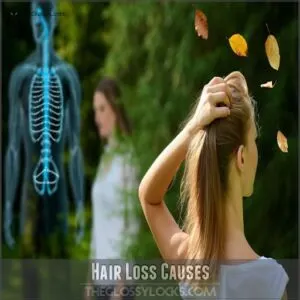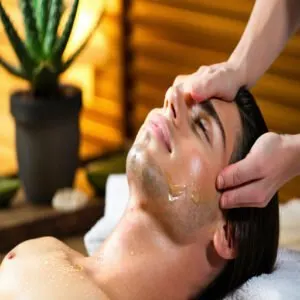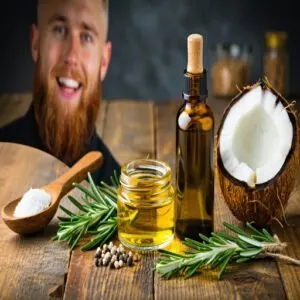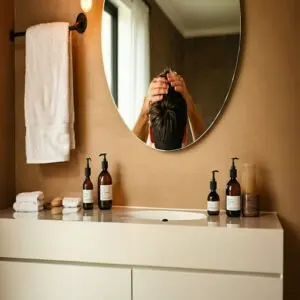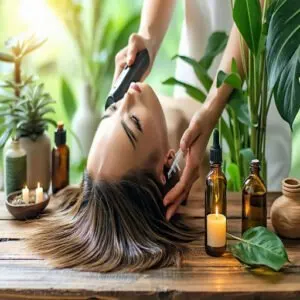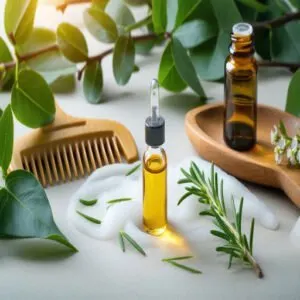This site is supported by our readers. We may earn a commission, at no cost to you, if you purchase through links.

Start with scalp massages to boost blood flow—think of it as a workout for your follicles.
Aloe vera and coconut oil can soothe and strengthen your scalp, while essential oils like rosemary add an invigorating touch.
Don’t forget your diet: load up on protein, iron, and vitamins like biotin to fuel regrowth from the inside out.
Even small changes, like avoiding tight hairstyles and managing stress, can make a big difference.
Ready to give your hair the VIP treatment it deserves?
Table Of Contents
- Key Takeaways
- Hair Loss Causes
- Natural Remedies
- Dietary Changes
- Home Treatments
- Preventing Hair Loss
- Frequently Asked Questions (FAQs)
- Is hair loss permanent?
- Do hot showers cause hair loss?
- Does caffeine stop hair loss?
- Can stress cause hair loss?
- Do hair transplants help hair loss?
- Does smoking cause hair loss?
- What is a good home remedy for hair loss?
- Can you regrow hair?
- What is the best treatment for thinning hair?
- How to stop obsessing over hair loss?
- Conclusion
Key Takeaways
- Massage your scalp daily to boost blood flow and pair it with natural oils like rosemary or coconut for added benefits.
- Stick to a protein-rich diet with biotin, iron, and omega-3s to strengthen hair from the inside out.
- Avoid tight hairstyles, heated tools, and harsh chemicals to prevent further damage and promote healthier hair.
- Manage stress with relaxation techniques like yoga or meditation to protect hair growth cycles.
Hair Loss Causes
Hair loss can happen for many reasons, from genetics and hormonal changes to stress or even tight hairstyles. Understanding what’s causing it helps you choose the right solution.
Genetic Factors
Blame your DNA for hair loss?
Androgenic alopecia, the most common type, often runs in families.
If your family history shows thinning hair, genetics likely play a role.
DNA analysis or genetic testing can reveal hereditary traits and inheritance patterns.
Understanding these genetic factors helps you tackle alopecia early, giving you a better shot at managing it effectively.
For more information on hair loss causes, visit the hair loss treatment options available to determine the best course of action.
Chemotherapy Effects
Chemotherapy side effects can hit hard, especially in the case of hair loss.
Cancer treatment targets fast-dividing cells, including hair follicles, leading to thinning or clumps of hair falling out.
For detailed information, explore this chemotherapy hair loss guide.
Scalp cooling therapy offers hope, reducing hair loss in many patients by protecting follicles.
While temporary, this hair loss solution can feel overwhelming—focus on gentle care and hair regrowth tips post-treatment.
Hormonal Imbalances
Hormonal imbalance can wreak havoc on your hair.
Thyroid issues, menopause symptoms, or adrenal fatigue may disrupt natural hair growth.
Elevated cortisol levels, often linked to stress, can also play a role.
Hormone therapy, like hormone replacement therapy, offers a potential hair loss cure.
Pair this with natural hair regrowth tips, like balanced diets, for better results.
Understanding the various hair loss causes is essential to addressing the root of the problem and finding an effective solution.
Hairstyle Damage
Tight hairstyles like tight braids or frequent hair tying can strain your scalp, leading to hair breakage, split ends, and even hair thinning.
Constant hair pulling damages follicles over time, causing frizzy hair and permanent loss.
Switching to looser styles is a simple hair fall solution.
Treating stressed strands with nourishing oils can also support your hair loss cure journey.
Natural Remedies
You can tackle hair loss naturally with simple, science-backed remedies that promote healthier, thicker hair.
From scalp massages to using aloe vera or essential oils, these methods are easy to try at home.
Scalp Massage Benefits
Scalp massage isn’t just soothing—it’s a natural hair loss treatment that stimulates blood flow to hair follicles, encouraging growth.
Use gentle massage techniques with your fingertips or a hair regrowth oil for added benefits.
This hair growth remedy also reduces tension, a sneaky culprit behind thinning hair.
Relaxation methods like this can turn stress into scalp stimulation for healthier strands.
Aloe Vera Gel Treatment
In the context of a home hair cure, aloe vera is a game-changer.
Packed with vitamins and fatty acids, its gel applications strengthen follicles, soothe scalp inflammation, and control excess oil.
You can find a variety of aloe vera gel products online.
For natural hair loss treatment, massage aloe vera onto your scalp to promote scalp health and hair regrowth.
This natural remedy also shields hair from UV damage, keeping it resilient.
Coconut Oil Uses
For a simple home hair cure, coconut oil is your go-to.
Packed with fatty acids, it strengthens strands and locks in moisture.
Regular oil massage improves scalp health and promotes hair growth.
Try this coconut therapy:
- Warm coconut oil for deeper absorption.
- Massage gently for 5-10 minutes.
- Leave overnight for intense hydration.
- Rinse with mild shampoo.
Essential Oils for Hair
If coconut oil feels like a hair care hero, essential oils are its trusty sidekicks.
Rosemary oil boosts circulation for stronger roots, while lavender oil brings calm and potential regrowth. Peppermint oil’s tingle sparks scalp stimulation, and cedarwood oil fights inflammation.
Blend these into hair serums or use for aromatherapy—your herbal extracts arsenal for healthier hair.
For superior results, understanding rosemary oil benefits is vital when creating personalized hair care routines.
Onion Juice Remedies
Packed with sulfur, onion juice boosts scalp stimulation and supports hair regrowth.
This natural remedy strengthens follicles, prevents hair loss, and promotes thicker strands.
For easy juice extraction, blend onions, strain, and apply directly to your scalp.
Leave it on for 30 minutes, then rinse.
Want hair regrowth tips? Add essential oils to mask the smell and enhance benefits.
Dietary Changes
What you eat plays a critical role in keeping your hair strong and healthy.
By adding nutrient-rich foods like protein, iron, and vitamins to your meals, you can support natural regrowth and reduce hair loss.
Protein Rich Foods
Boosting your protein intake is like giving your hair a solid foundation.
Protein sources like eggs, fish, and meat alternatives fuel hair regrowth by strengthening strands.
Eggs are packed with biotin, while fish offers omega-3s for scalp health.
For plant-based eaters, lentils and quinoa work wonders.
Balanced food nutrition isn’t just hair loss prevention—it’s a natural remedy for vibrant hair growth.
Understanding the complete protein sources is essential for creating a diet that promotes healthy hair regrowth and overall well-being.
Iron Intake Importance
If you’re tackling hair loss, don’t overlook iron.
Low iron levels, often tied to anemia, can weaken hair follicles and slow growth.
Boost nutrient absorption with dietary sources like spinach, lentils, and red meat, or consider iron supplements.
Pairing iron with hair growth vitamins enhances results.
Balanced protein intake also supports hair loss prevention and overall scalp health.
Vitamin Supplements
In the context of hair growth vitamins, vitamin supplements can fill gaps in your diet.
A vitamin D deficiency, for instance, may slow hair growth, while biotin benefits hair strength.
Folic acid and zinc intake also support healthy strands.
Remember, supplement safety matters—too much can backfire.
Stick to balanced doses for ideal results without risks.
Mediterranean Diet Benefits
The Mediterranean diet is a powerhouse for hair growth.
Packed with healthy fats, olive oil benefits, and whole grain importance, it promotes nutrient balance and reduces hair loss.
Fresh herb usage and antioxidant-rich foods like nuts and fish support natural remedies for regrowth.
This nutrition-focused approach offers a sustainable hair loss cure while boosting overall health.
Raw Vegetables and Herbs
Switching to raw vegetables and herbs isn’t just about salads—it’s about feeding your hair from the inside out.
Add these to your plate:
- Fresh greens like spinach for iron and folate.
- Herbal infusions with fenugreek seeds or Chinese hibiscus.
- Vegetable juicing with carrots and celery.
- Raw food diets rich in antioxidants.
- Green smoothies blended with aloe vera.
The concept of incorporating these elements into your diet is to provide your body with the necessary nutrients for healthy hair growth, focusing on the internal benefits of a balanced diet rich in raw vegetables and herbs.
Home Treatments
You’ve got plenty of options at home to tackle hair loss with effective treatments backed by science.
From topical solutions like minoxidil to advanced techniques like microneedling, these methods can promote regrowth and improve scalp health.
Minoxidil Applications
In the context of a hair loss cure at home, minoxidil is a proven option.
Start with proper scalp preparation—clean and dry is key, and follow the recommended minoxidil dosage, typically 1-2 milliliters daily.
Massage it gently for better absorption, as consistency is vital; this hair growth treatment works over months.
Stick with it, and you’ll see gradual hair regrowth, for maximum results, understanding minoxidil application techniques is essential to maximize the effectiveness of the treatment.
Finasteride Uses
Finasteride is a prescription hair growth treatment often used for male pattern baldness.
It works by blocking DHT, a hormone linked to hair loss.
- Dose management is key—stick to your doctor’s guidelines.
- Expect noticeable hair regrowth after consistent use for several months.
- Be aware of potential side effects like decreased libido; discuss concerns with your doctor.
Laser Treatment Options
Low-level laser therapy (LLLT) offers a painless path to hair regrowth right at home.
Using FDA-cleared devices like laser caps and combs, you’ll spend just 15-20 minutes three times weekly applying light treatment to your scalp.
Recent research shows LLLT’s impressive 90% success rate for both men and women, with results visible in about five months.
Plus, you won’t experience downtime – just pop on your device and let photobiomodulation work its magic, which is a key aspect of low-level laser therapy.
Microneedling Benefits
If laser treatments feel too high-tech, microneedling offers a hands-on approach to hair regeneration.
By creating tiny punctures, it boosts collagen, blood flow, and absorption of hair growth treatments.
Think of it as a workout for your scalp—encouraging stronger, healthier strands.
Microneedling results can pair with topical solutions for better hair regrowth and even skin rejuvenation.
Steroid Injections
Steroid injections are a targeted hair loss cure, especially for alopecia.
This injection therapy uses corticosteroid treatment to calm inflammation and boost hair regrowth.
While effective for scalp health, steroid side effects like thinning skin or discoloration can occur.
Results vary, but many see improvement within weeks.
It’s a medical procedure worth exploring among hair loss remedies.
For ideal results, considering natural hair growth remedies can complement medical treatments and promote overall hair health.
Preventing Hair Loss
You can prevent hair loss by adopting simple habits like using gentle hair care techniques and avoiding excessive heat or harsh chemicals.
A balanced diet and stress management also play a key role in keeping your hair strong and healthy.
Gentle Hair Care
A gentle hair care routine can work wonders for preventing hair loss.
Start with these tips:
- Hair Brushing Tips: Use a wide-tooth comb to avoid breakage.
- Gentle Shampooing: Opt for sulfate-free shampoos to protect your scalp.
- Scalp Exfoliation: Remove buildup weekly with a mild scrub.
- Hair Towel Tricks: Pat hair dry—don’t rub!
For further guidance on preventing hair loss, explore female hair loss prevention strategies.
These home remedies for hair care promote healthier, stronger strands.
Reducing Heated Products
Overusing heat tools can fry your strands faster than a bad dye job.
Swap them out with heat styling alternatives like air-drying or heatless curls.
If you must use a dryer, stick to low hair dryer settings and always apply thermal protection sprays.
Simplifying your hair care routines reduces damage, promoting hair growth and making your hair loss cure at home journey smoother.
Avoiding Chemical Treatments
Switching to natural hair care can help stop hair loss and prevent further damage.
Avoid harsh chemical treatments like perms, relaxers, or bleaching, which weaken strands over time.
Opt for chemical-free products, gentle shampoos, and organic conditioners instead, and try hair dye alternatives like henna or herbal rinses.
These small changes support a hair thinning cure and promote healthier regrowth.
Stress Management Techniques
Stress can wreak havoc on your hair, but relaxation techniques like deep breathing, yoga practices, and mindful exercises can help.
Meditation benefits both your mind and your scalp by reducing tension that contributes to hair loss.
Pair these with a soothing scalp massage at home for a double dose of calm and regrowth potential. Keep stress in check—your hair will thank you!
Nutritious Diet Importance
If you’re managing stress, don’t overlook your plate.
Balanced meals packed with fresh fruits, whole grains, and nutrient-dense options fuel hair growth from the inside out.
Healthy snacks like nuts or seeds can fill gaps, while addressing vitamin D deficiency with nutritional supplements supports follicles.
Your diet isn’t just food—it’s your hair’s secret weapon for strength and shine.
Frequently Asked Questions (FAQs)
Is hair loss permanent?
Hair loss isn’t always a life sentence.
Some types, like stress-induced or postpartum shedding, are temporary.
But genetic conditions, like male-pattern baldness, may stick around.
Early care, diet tweaks, or treatments can make a difference.
Do hot showers cause hair loss?
Hot showers don’t directly cause hair loss, but they can dry out your scalp and weaken hair over time.
Stick to lukewarm water to protect your hair’s natural oils and keep it healthy.
Does caffeine stop hair loss?
Think of caffeine as a double-edged sword—it stimulates hair follicles in some studies, promoting growth.
But don’t bank on it entirely, as consistent use and realistic expectations are key to seeing any potential benefits from topical caffeine products.
Can stress cause hair loss?
When life feels like a pressure cooker, your hair can pay the price.
Chronic stress disrupts hair growth cycles, causing strands to shed prematurely.
Managing stress with exercise, meditation, or hobbies can help protect your locks.
Do hair transplants help hair loss?
Hair transplants can effectively restore hair in areas with significant loss by relocating healthy follicles.
While it’s a long-term solution, success depends on your hair type, surgeon’s skill, and proper aftercare to guarantee natural results.
Does smoking cause hair loss?
Lighting up might feel cool, but smoking’s a double agent—it restricts blood flow to hair follicles and triggers oxidative stress, which can weaken strands.
Quit the habit, and you’ll give your hair a fighting chance.
What is a good home remedy for hair loss?
Try massaging your scalp with rosemary oil—it boosts blood flow and may encourage hair growth.
Pair it with a protein-rich diet and biotin supplements for stronger strands.
Consistency is key, so stick with it!
Can you regrow hair?
Regrowing hair isn’t a pipe dream.
With consistent scalp care, nutrient-rich foods, and proven treatments like minoxidil or rosemary oil, you can encourage growth.
Patience is key—hair takes time to bounce back.
What is the best treatment for thinning hair?
Focus on boosting scalp health with regular massages, a nutrient-rich diet (biotin, zinc, iron), and natural remedies like rosemary oil.
Combine this with gentle hair care and, if needed, consult a doctor about minoxidil.
How to stop obsessing over hair loss?
Shift your focus to what you can control—healthy habits, stress management, and a balanced diet.
Hair loss doesn’t define you, and obsessing only fuels anxiety.
Embrace patience; progress takes time, not constant worry.
Conclusion
Think of your hair as a garden—it thrives with consistent care and the right nutrients.
Tackling hair loss at home is possible with natural remedies like scalp massages, aloe vera, and essential oils, combined with a nutrient-rich diet packed with protein and biotin.
Small lifestyle tweaks, such as avoiding harsh treatments and managing stress, also play a key role.
By embracing these steps, you’re giving your scalp the foundation it needs for regrowth and healthier hair.
- https://www.medicalnewstoday.com/articles/324971
- https://www.verywellhealth.com/home-remedies-for-hair-growth-8599227
- https://www.webmd.com/skin-problems-and-treatments/hair-loss/remedies-for-hair-loss
- https://www.goodrx.com/well-being/alternative-treatments/natural-hair-growth-products-remedies
- https://www.harleystreethairtransplant.co.uk/8-natural-remedies-for-hair-loss/

